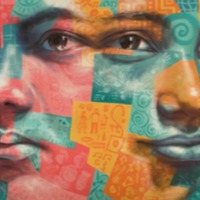
To cross the Sahara from Sudan to Libya is very difficult. In Sudan, when you hear people talking about the Sahara, you’d say to yourself, if they could make it, then I can make it too. But that’s not the case, it’s very difficult. The route from Sudan to Libya is full of extreme difficulties and challenges to the extent that you’d think you won’t make it.
You'd travel three days in the Sahara and lose your way. There are no trees or anything, you can see nothing except the sky and an endless sandy landscape. There is thirst. We travelled for three days in the Sahara to get to Libya. They’d give us water only once, in the morning. They’d beat us to hurry up, saying Yallah, there are thieves and bandits on the way.
Our brothers would fall and die of thirst. You just leave them there; you don’t even bury them properly. This is the reality. We dumped many of our brothers and sisters on the way. The Sahara is difficult.
[…]
Even when you arrive, they only give you food in the morning or in the evening. There is also thirst and filth. I spent two dreadful years in Libya. Those two years were the same every day, day and night. Macaroni for breakfast or dinner. You wouldn’t wish such a life for your brothers and sisters.
[…]
There was hunger, we didn’t eat or drink for three days. But you’d remember the terrible life that you just got away from. But you’d remember the terrible life that you just got away from.
We shouldn’t forget our brothers. Just because we made it to Europe, we shouldn’t forget what happened to us back there and shouldn’t forget our brothers and sisters. Because we know how it is back in Libya. We know how they are living at this moment. What their daily life looks like. We shouldn’t forget out brothers who are suffering in Libya. Just because we arrived here, we shouldn’t forget about them. We shouldn’t be distracted by temporary gains; we should do our best to help them to get out of there.
[…]
We see many things on Facebook, don’t let such things persuade you. What I want to tell you is, we know what happened to us and what we had to go through. Only those who’ve been through it would know about it. So, my brothers, what I want to say at the end, I can’t say more than what I’ve said, all the bad things that happened to us should stop with us.
Narrative produced by Telling the Real Story, an initiative facilitated by UNHCR The UN Refugee Agency
Original narrative can be found at https://www.tellingtherealstory.org/en/stories/video/three-eritreans-story/









